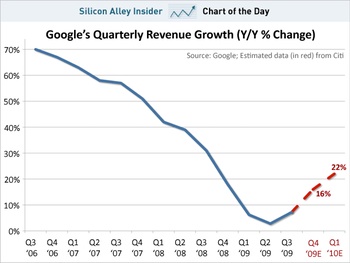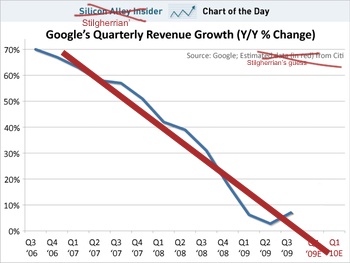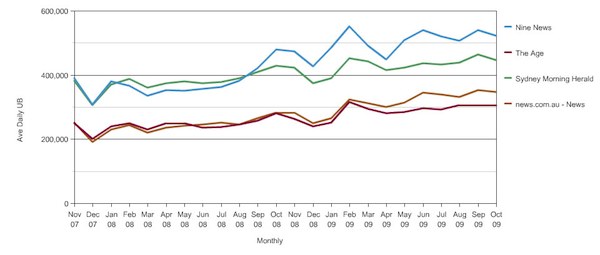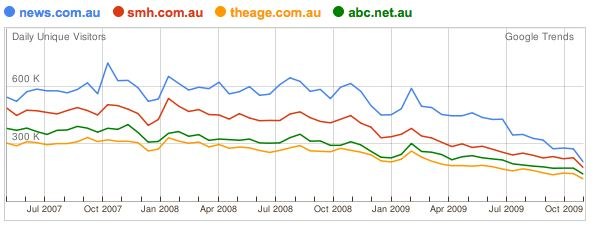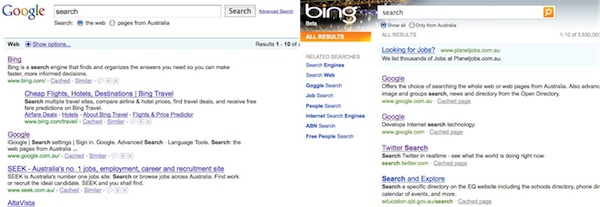The highlight of my week of Monday 20 to Sunday 26 November 2023 was really stupid. I ended up in The Media™ again, this time because I’d posted on the socials about Microsoft’s Bing Search telling the world that Australia didn’t exist. So, so stupid.
Continue reading “Weekly Wrap 704: Working gently in the background and encountering the Pigeon of Dignity”Internet financial projections are bullshit
It’s no secret that the high-growth venture-capital-driven Internet industry is a hype-laden circus of misinformation. But today’s Chart of the Day from Silicon Alley Insider (right) really takes the biscuit.
Here we see that since Q3 of 2006, Google’s quarterly revenue growth has steadily declined from a cancerous 70% year-on-year to under 10% for the last three quarters.
Now there’s nothing wrong with an 8% growth rate. That’s pretty much up there with China, for instance. And the only countries growing faster than China are starting from a very low base. Think of such economic powerhouses as Angola, Bhutan, Rwanda and Timor-Leste.
OK, I know countries and companies aren’t the same thing, but that’s not my point.
Look at the bottom right of that first graph.
Citi reckons that Google’s growth in the next two quarters will increase in a more-or-less straight line that’s even steeper than that most recent quarter-on-quarter increase. Based on fucking what, Citi? That’s the only quarter showing growth in the entire chart!
Surely this second graph is a more realistic projection based on the data available.
There’s precisely zero science here. I just grabbed the straight-line tool in my graphics program and drew in a red line by eye. I certainly couldn’t be arsed doing this properly with, you know, mathematics. But…
Honestly, which of these “projections” looks more realistic to you?
As I say, there’s no science here. Perhaps we can add some analysis.
What factors might be affecting Google’s potential for increased revenue growth?
On the plus side:
- Google is operating in a marketplace which is still growing, and perhaps even growing faster than last year as we emerge from the global financial crisis. Then again, so is everyone else.
- Google’s got a new product line coming out, those Android phone thingamabobs, and people are wetting themselves to get one. Well, at least until Apple reveals their new toy next week.
- Google pwns the Internet.
- What else?
But working against that:
- Google is subject to increased competition, especially from Microsoft’s Bing and related products and services.
- Rupert Murdoch is up to something, although admittedly he might not have the faintest idea what he’s doing.
- Every market eventually reaches a plateau. The key bullshit image of the first dot.com boom was the classic revenue projection of a start-up: exponential growth continuing forever. Well, here in rich white Western countries, all the folks who are using the Internet are pretty much there already. There might be more volume of data, but the amount of attention span you can sell to advertisers ain’t going to rise so much.
- What else?
We also need to remember that these are revenue figures, not profit. And that’s my core point. Simplistic “Oooh, aah!” gawking over one numerical measure without context is wankery. Why do we let analysts get away with it?
All that said, I’m no financial analyst. What would I know? So if you know better, set me straight. There’s a “Reply” box below…
Oh, and Google’s Q4 revenue figures will be announced tomorrow. So we’ll have one more real data point then. Stand by.
Has Google Trends data made me look a goose?
Yesterday I wrote an article for Crikey plus a post here based on Google Trends data which, it now appears, is dodgy.
Google Trends shows a steady decline in traffic to various websites since about September 2008, based on the metric “unique daily browsers”. But I was howled down. Everyone else’s metrics were not showing such a decline.
Indeed many, such as this chart of Nielsen NetRatings’ unique dailies, provided by Andrew Hunter (@Huntzie), Head of News, Sport and Finance at ninemsn, showed the exact opposite.
For example, news.com.au grew from 250,829 average daily unique browsers (UBs) in July 2008 to 346,367 in October 2009, a 38% increase. Not the roughly 50% drop shown by Google Trends.
Google says:
Trends for Websites combines information from a variety of sources, such as aggregated Google search data, aggregated opt-in anonymous Google Analytics data, opt-in consumer panel data, and other third-party market research. The data is aggregated over millions of users, powered by computer algorithms…
In other words, it’s some Google Secret Sauce. But has the sauce gone off?

The Google Trends forum is rather quiet. There were only three questions or comments posted for the whole of September, none of which received a reply, and nothing since. I can’t see that anyone from Google has responded to anything for months and months — I gave up looking back any further. Others have noted that Google Trends data differs wildly from Google’s own Analytics product — usually complaining that it shows significantly less traffic.
Google Trends is a Google Labs product, i.e. an experiment, I’m starting to think that it’s been abandoned and we’re just seeing a slow degradation due to lack of maintenance.
Meanwhile, I have changed my Twitter avatar to a goose for the rest of today.
Is social media killing the web (as we’ve known it)?
If Google Trends’ statistics are to be trusted, it looks like there’s been a significant decline in traffic to websites over the last year — not just news, but everywhere. Except social network sites.
Following a blog post by Nicholas Moerman, a planning intern with Proximity in London, I checked out the figures for Australia sites. It does indeed look like there’s been a significant drop in daily unique visitors — which is what Google Trends measures, rather than the more common monthly uniques.

I’ve written more, and provided more graphs, in a piece for Crikey today, Is social media killing the web as we know it?
Oh, and I was also in Crikey yesterday, Baffled by Murdersoft? Making sense of Murdoch and Microsoft, where I look at some of the numbers behind the rumoured deal between News Corporation and Microsoft’s Bing search engine.
Murdoch’s wrong about Google

I reckon Rupert Murdoch’s plan to block Google from indexing News Corporation stories is daft, and I said so in Crikey yesterday with a piece they headlined Dear Rupert, this is how the internet works. Google it.
In brief, my commentary is that people don’t really get their news in a monolith any more, neither the daily newspaper or the nightly TV bulletin. Instead, they gather it from all over in little pieces. If you want people to find your stories, those stories need to be in the indexes.
Crikey editor Jonathan Green has also pointed out the stark difference between News Corporation and Google. I reckon News needs Google more than Google needs News.
Jason Calacanis has a different theory, that News will do an exclusive deal with Microsoft’s Bing.
“Want to search the New York Times, Wall Street Journal, USA Today and 3,894 other newspapers and magazines?
“Well, then don’t go to Google because they don’t have them!
“Go to Bing, home of quality content you can trust!”
Which might work if News Corporation were the only supplier of general news. Which it isn’t. And which point I make in my Crikey piece.
Google and Bing, sitting in a tree…
This is sweet! Look what happens when you search for the word “search” on the world’s two leading Internet search engines.
Yes, if you Google for “search” the first result is Bing. And if you Google it on Bing, the first result is Google. Now who said these guys were competitors?
Hat-tip to Derek Jenkins (@ozdj), and doubtless others as the meme spreads.


